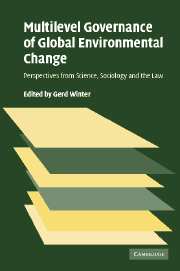 Multilevel Governance of Global Environmental Change
Multilevel Governance of Global Environmental Change Book contents
- Frontmatter
- PREFACE
- Contents
- List of figures
- List of tables
- Notes on contributors
- List of abbreviations
- 1 Introduction
- PART I Earth system analysis
- PART II Society and institutions of global; environmental change
- PART III Self-regulation of industry and the law
- PART IV The potential of the state
- PART V The potential of world regions
- PART VI Formation and implementation of international regimes
- PART VII Improving the instruments of global governance
- PART VIII Fundamental concepts of institutionalising common concern
- 21 Global environmental change and the nation state: sovereignty bounded?
- 22 Whose environment? Concepts of commonality in international environmental law
- 23 Globalising environmental liability: the interplay of national and international law
- 24 The legal nature of environmental principles in international, EU, and exemplary national law
- Index
21 - Global environmental change and the nation state: sovereignty bounded?
Published online by Cambridge University Press: 04 May 2010
- Frontmatter
- PREFACE
- Contents
- List of figures
- List of tables
- Notes on contributors
- List of abbreviations
- 1 Introduction
- PART I Earth system analysis
- PART II Society and institutions of global; environmental change
- PART III Self-regulation of industry and the law
- PART IV The potential of the state
- PART V The potential of world regions
- PART VI Formation and implementation of international regimes
- PART VII Improving the instruments of global governance
- PART VIII Fundamental concepts of institutionalising common concern
- 21 Global environmental change and the nation state: sovereignty bounded?
- 22 Whose environment? Concepts of commonality in international environmental law
- 23 Globalising environmental liability: the interplay of national and international law
- 24 The legal nature of environmental principles in international, EU, and exemplary national law
- Index
Summary
Introduction
In spite of early hopes for a ‘fading away’ of sovereignty in the face of global environmental challenges, recent codifications of international law have confirmed the creeping national enclosure of what were once considered common assets, e.g., exclusive economic zones under the Law of the Sea Convention 1982; and access to genetic resources, from the 1983 International Undertaking via the Biodiversity Convention 1992 to the Plant Gene Treaty 2001. Yet, because of their explicit limitation and qualification by ‘common interest’ obligations, these expanded sovereign rights of nation states must be considered fiduciary rather than proprietary. The emerging legal regime is one of international public trusteeship (sometimes referred to as guardianship or stewardship) over a widening range of environmental resources. This chapter traces the evolution of the public trust concept in modern environmental law and its ramifications for international law and governance, as reflected in proposals suggesting a new environmental mandate for the UN Trusteeship Council.
All revolutions have their iconoclastic phase. When international lawyers first embraced the global environmental revolution – looking for icons to smash – they were eager to pick on the nation state as a target: not surprisingly, much of the early literature on international environmental law and governance started from a radical critique of territorial sovereignty, suspected to lurk at the roots of many transnational environmental problems; and from high hopes for an ‘erosion’ or ‘perforation’ of operational sovereignty, as the preferred solution to those problems.
- Type
- Chapter
- Information
- Multilevel Governance of Global Environmental ChangePerspectives from Science, Sociology and the Law, pp. 519 - 538Publisher: Cambridge University PressPrint publication year: 2006
- 3
- Cited by


